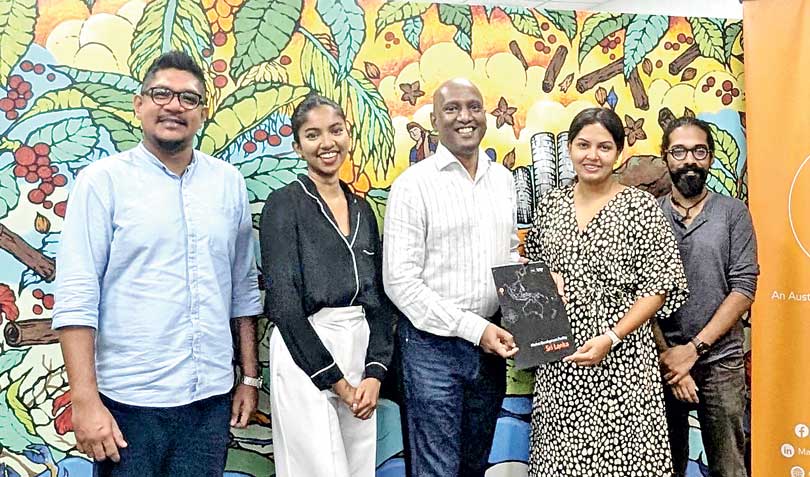Friday Feb 27, 2026
Friday Feb 27, 2026
Tuesday, 30 July 2024 00:06 - - {{hitsCtrl.values.hits}}

From left: MDF Business Adviser Ruchira De Silva, Santani Head of CSR and Sustainability Sonali Silva,Founder and CEO Vickum Nawagamuwage, MDF Deputy Country Director Subraja Subramaniam, and Santani Director of Brands Dhyresh Mendis
Santani Wellness Resort has announced a ground-breaking partnership with the Australian Government-funded Market Development Facility (MDF), marking a transformative milestone in the development of Sri Lanka’s cultural tourism.
This strategic collaboration aims to create an innovative, sustainable tourism product that showcases the rich cultural and wellness heritage of Sri Lanka, positioning the island nation as a premier destination for discerning global travellers.
Australian High Commissioner to Sri Lanka, Paul Stephens said: “Australia is proud to support the recovery of Sri Lanka’s tourism sector through partnerships like the one between Santani and MDF. We are committed to building inclusive business models that strengthen sustainable practices, preserve cultural heritage, and promote long-term growth in Sri Lanka’s tourism industry. This collaboration exemplifies our dedication to fostering meaningful, sustainable tourism practices that benefit local communities and elevate Sri Lanka to a global wellness destination.”
Santani Wellness Resort, celebrated for its pioneering approach to wellness and hospitality, sees this partnership as a pivotal opportunity to elevate its mission of delivering unparalleled guest experiences while preserving and promoting Sri Lanka’s unique cultural traditions and healing practices.
Santani Founder Vickum Nawagamuwage said: “We are thrilled and thankful to partner with MDF on this landmark cultural tourism development initiative. This partnership marks a significant milestone for Santani and Sri Lanka, enabling us to create a new cultural tourism product that is sustainable, and expands the wellness offerings of Sri Lanka. Together, we will redefine excellence and innovation, offering guests an unparalleled experience while preserving the rich cultural and healing heritage of Sri Lanka. This collaboration embodies our shared vision for impactful, sustainable growth that benefits both our community and the environment.”
MDF’s focus on Sri Lanka includes support for export-oriented and high-value segments of the agriculture, coffee, and tourism sectors, which are crucial for inclusive economic growth. Through strategic investments, MDF promotes climate change mitigation and adaptation, enhances access to finance, and fosters the adoption of digital tools, ensuring sustainable development across these vital sectors.
MDF Country Director Sri Lanka Maryam Piracha said: “The partnership between Santani and MDF is a transformative alliance that will support Sri Lanka’s tourism sector. The union of Santani’s wellness programs with MDF’s sustainable development expertise, aims to create immersive cultural tourism experiences. This initiative will support local artisans, preserve traditional practices, and position Sri Lanka as a premier destination for travellers seeking meaningful, eco-friendly journeys. We are confident that this initiative will encourage the industry to create innovative business strategies and new avenues that encourage wellness practices within the sustainable tourism space.”
The partnership between Santani and MDF will focus on several key initiatives, including the development of cultural tourism programs that integrate traditional Sri Lankan arts, crafts, and wellness practices. These programs aim to provide visitors with immersive and authentic experiences, support local artisans, and preserve traditional knowledge.
MDF’s expertise in sustainable development aligns seamlessly with Santani’s commitment to environmental stewardship and community engagement. By merging Santani’s innovative wellness programs with MDF’s strategic development capabilities, the partnership promises to enhance Sri Lanka’s tourism landscape, provide economic benefits to local communities, and ensure the preservation of cultural heritage for future generations.